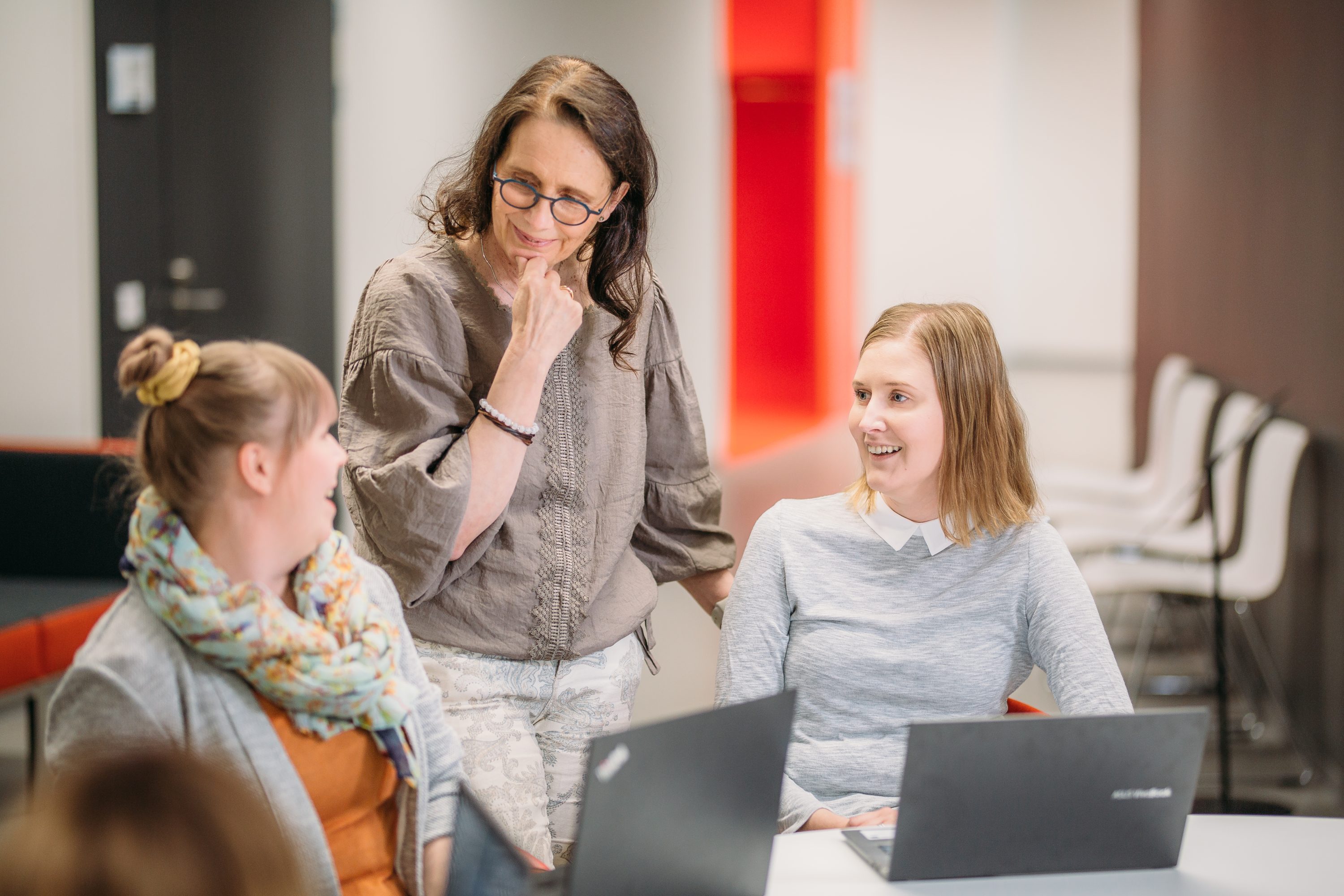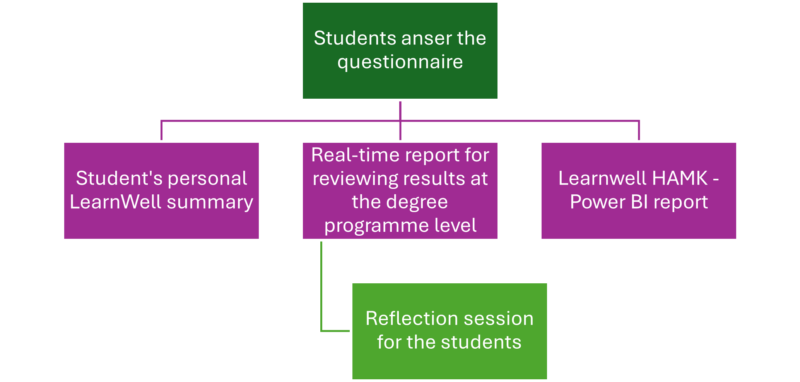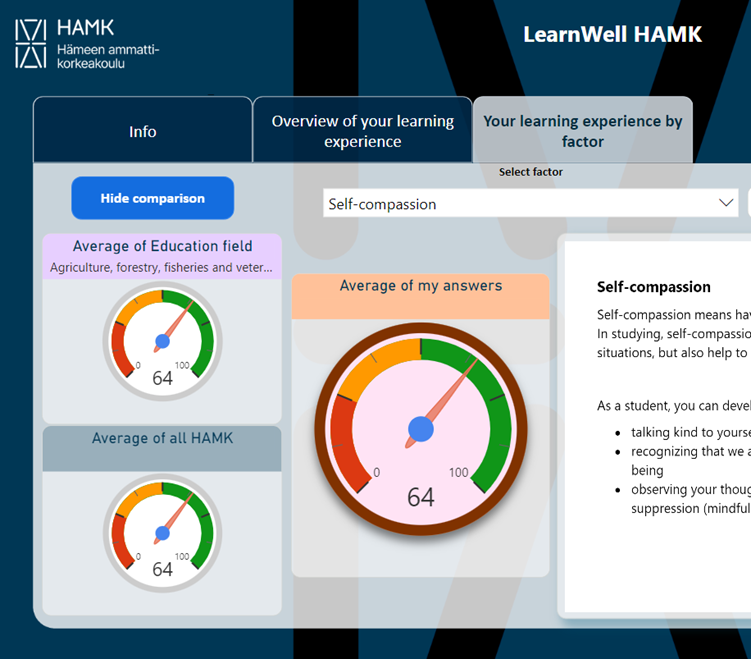
LearnWell
The LearnWell Study Experience Questionnaire
HAMK’s LearnWell research area studies and develops learning, teaching, and well-being in the contexts of education and working life.
The research area conducts research in higher education context on topics related to learning, teaching, and well-being. The LearnWell research area carries out an annual study experience questionnaire for HAMK students in cooperation with guidance counsellors and other staff.
The LearnWell Study Experience Questionnaire measures students’ learning processes, experiences of the learning environment, general working life skills, and study well-being. The questionnaire is adapted from the University of Helsinki’s HowULearn survey and is partly based on the Study Ability Model developed by the FSHS (YTHS). The LearnWell research area has further developed the questionnaire to suit for the UAS context and to meet the needs of HAMK, using indicators validated in previous studies.
The aims of the LearnWell Study Experience Questionnaire are:
- To increase and support students’ self-reflection skills and study-related awareness .
- To collect and utilize research-based data in development of teaching and learning.
- To support the pedagogical well-being of the entire community by increasing our understanding of the building blocks of a well-being learning environment.
At HAMK, students answer the LearnWell questionnaire as part of the teaching activities, for example in a meeting organised by the study counsellor or the tutor teacher. Answering the questionnaire is voluntary. In addition to responding to the questionnaire, students can participate in a reflection session to review the results at the degree programme level and to discuss the areas that according to their responses need improvement. These LearnWell sessions are typically facilitated by the study counsellors, either independently or in collaboration with the LearnWell researchers.
Process map:

The LearnWell questionnaire results in three reports that are meant for different purposes:
- Student’s personal LearnWell summary
- Real-time report for reviewing results at the degree programme level
- Learnwell HAMK – Power BI (requires HAMK login)

Reporting and feedback texts have been developed in collaboration with HAMK’s students. The pilot version of students’ personal summary was designed and implemented in the Design Factory Project course by Computer Applications students Catarina Kaucher, Heidi Nuust, Heidi Peltola, Edem Quashigah, Linnea Laukkanen, Elsayed Mahmoud, Soroush Sohrabian, and Maija Nevalainen. The final versions of the reporting were carried out by Senior BI Specialist Jari Järvinen in collaboration with LearnWell researchers.
LearnWell researchers have developed descriptions and reflection questions for the dimensions measured and reported in the questionnaire. The aim is to inform the degree programmes and students about what the measured phenomena mean in the higher education context and, on the other hand, how these areas can be influenced and developed from both the student and teaching perspective. The descriptive texts have been developed in collaboration with HAMK students and cover three broader areas: student well-being, experiences of the study environment, and approaches to learning.
The LearnWell questionnaire measures student well-being through the following dimensions: psychological flexibility, self-efficacy, and self-compassion. The lack of well-being is examined in this questionnaire through measures of study-related burnout and self-criticism.
The LearnWell questionnaire measures the experiences of the study environment with questions about peer support, collaborative working, feedback, alignment of teaching, and interest and relevance.
The LearnWell questionnaire also measures approaches to learning, that is deep approach to learning, unreflective (surface) approach to learning, and organised studying.
Example of self-compassion items, description of the dimension, and reflection question from a teaching perspective:
Self-compassion
Items are answered on a five-point Likert scale (Neff, 2003; Lopez et al., 2015)
- I try to be understanding and patient towards those aspects of my personality I don’t like.
- When something painful happens, I try to take a balanced view of the situation.
- I try to see my failings as part of the human condition.
Self-compassion means having a kind and understanding attitude towards yourself. In studying, self-compassion may support coping and recovering from stressful situations, but also help to prevent study-related stress.
As a teacher, you can help your students to develop their self-compassion by
- acting as an example: how do you talk to yourself when facing challenges in teaching or as a teacher? How do you react when you don’t know something?
- being compassionate towards students’ trials and errors.
Reflect together on the above and give feedback to your degree programme: What practical aspects of your studies have supported you to treat yourself in a more kind and compassionate way?
The LearnWell questionnaire provides research-based information on students’ study experiences. The results are discussed at the degree programme level immediately after collecting the answers but are also used for the long-term development.
Degree programmes receive their results as a report containing a breakdown of the distribution of responses and the responses by year and by student group.
The results assist with research-driven development of training and teaching, as well as the provision of appropriate and targeted support to students. The results can be followed up over the years.
- LearnWell ohjauksen tukena: oppimiskokemuskysely ja ryhmäreflektio yhteistyössä opinto-ohjaajien kanssa keväällä 2023 – HAMK Beat
- Oppijalähtöisyys hyvinvointia tukevan ja rakentavan korkeakouluopetus- ja oppimisympäristön kehittämisen lähtökohtana – HAMK Unlimited
- Korkeakouluoppimisen ja opiskeluhyvinvoinnin yhteydestä – HAMK Unlimited
- Positive trends in HAMK first-year students’ wellbeing and learning experiences – HAMK Unlimited
Contact

